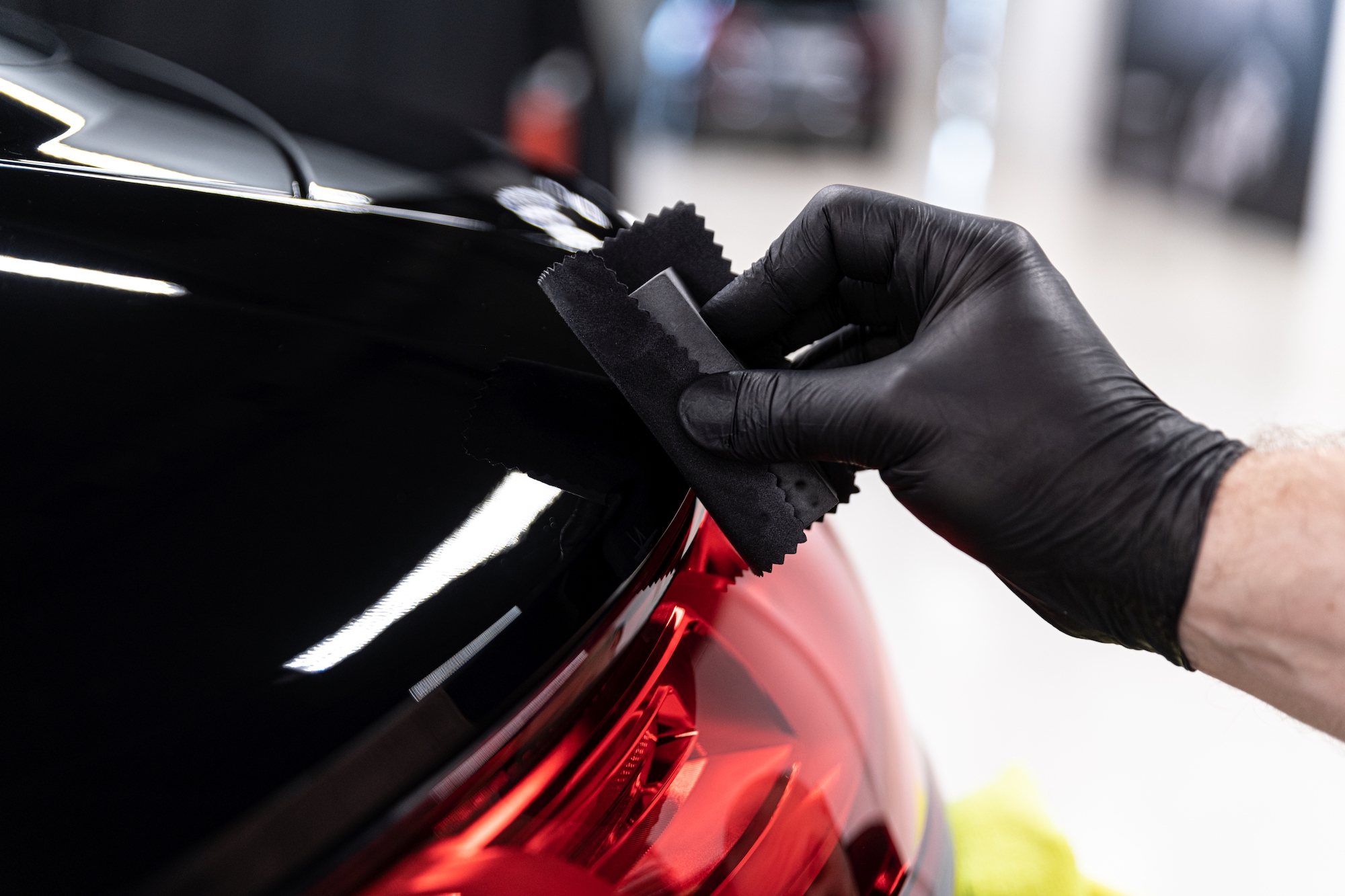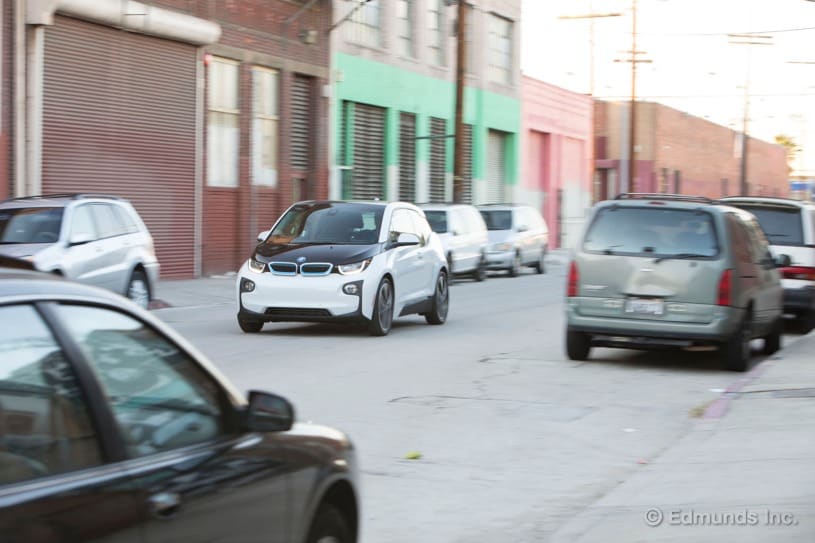Winnebago Ekko pop-up 4×4 motorhome charges toward off-grid adventure
In a market dominated by home builds and customs, Winnebago became one of the first major American RV manufacturers to embrace the overland adventure trend when it introduced the Revel camper van in 2017. Realizing that some of its off-road #vanlife customers might already be outgrowing the van, stepping up from adventurous couples to adventurous families, it follows the Revel up with the all-new Ekko. The four-sleeper B+ motorhome creates a roomier base camp without nullifying the compact, nimble, all-season capability of the all-wheel-drive Ford Transit below.
Winnebago describes the Ekko’s ambitions as combining the efficiency of a camper van (Class B) with the capacity of a Class C motorhome, a fancy way of calling it a B+ motorhome. Something of an ill-defined gray-area category, the B+ motorhome typically has a compact, alcove-free living module atop a van chassis, offering more interior space than a van without stretching out to a cumbersome length like full-blown Class C and A vehicles. The Ekko makes the cut by carrying a roomier interior inside its tall, boxy body, wearing an angular wind deflector in place of a sleeper alcove, and measuring in at 278 in (706 cm) long, shorter than any of Winnebago’s other Class C offerings and about 14 in (36 cm) longer than the extended-length Ford Transit van.
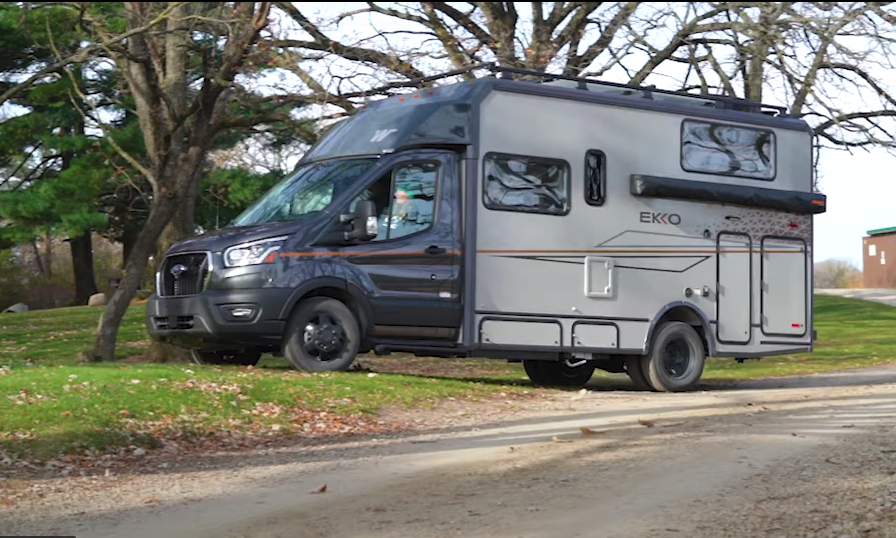
Winnebago
The Ekko isn’t quite an all-out expedition vehicle like the comparable-length Bimobil EX 435, but it exudes some of the same boundless, all-terrain power. It’s packed with hard angles and strong lines, right down to the graphics on its sides. Light-colored RV boxes are usually boring and predictable, but Winnebago adds some aesthetic-boosting contrast with the black-out edges, sidewall graphics, and colored van cab. It’s not as seamlessly integrated as something like the La Strada Nova, but the cab-to-motorhome side graphics and cab roof wind deflector create a closer melding of cab and box.
Adding some credibility to the all-terrain look, the Ekko comes built on a Ford Transit AWD as standard. The Transit’s intelligent AWD system continuously monitors driving conditions and feedback, adjusting torque between the axles. Drivers can fine-tune the system for specific conditions with selectable drive modes that include “slippery” and “mud/ruts.” Drive power originates in Ford’s 310-hp 3.5-liter EcoBoost V6 mated to a 10-speed Selectshift automatic transmission, which will presumably help deliver a more fuel-frugal ride … as far as motorhomes go.
Beyond adding all-terrain capability, Winnebago builds the Ekko up to a four-season standard. It uses an all season-grade insulation in the walls, floor and roof, adds in dual-pane acrylic windows, keeps all the water tanks and plumbing inside the cabin, and heats exterior compartments like the bicycle-sized pass-through rear garage. A Truma heater and tankless water heater are part of the standard equipment package, and a standard Coleman Mach-10 fine-tunes the interior climate at the other end of “all” season.
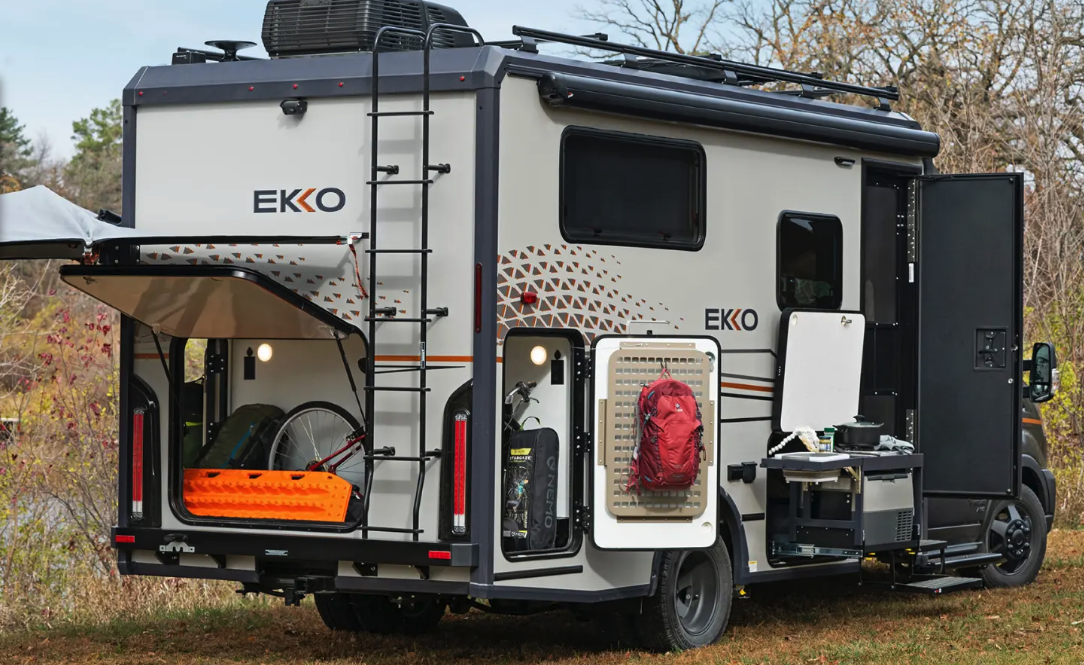
Winnebago
For years Winnebago has been paying close attention to overland and outdoor recreation consumers and modeling products like the Revel and Hike around their needs. The Ekko follows suit with a feature set that’s a little different from average. In addition to indoor cooking, an optional slide-out kitchen takes cooking outside. Located just to the side of the passenger-side entry door, this kitchen includes its own dual-burner gas stove, Dometic fridge/freezer, articulated faucet over top a removable, collapsible sink basin that doubles as a cutting board, and flip-up counter extension.
A standard Bluetooth-controlled awning extends out over the top of the outdoor kitchen area. Those looking for more shade can add an available batwing awning for coverage on the driver’s side and rear, a feature more commonly found on off-road camper trailers.
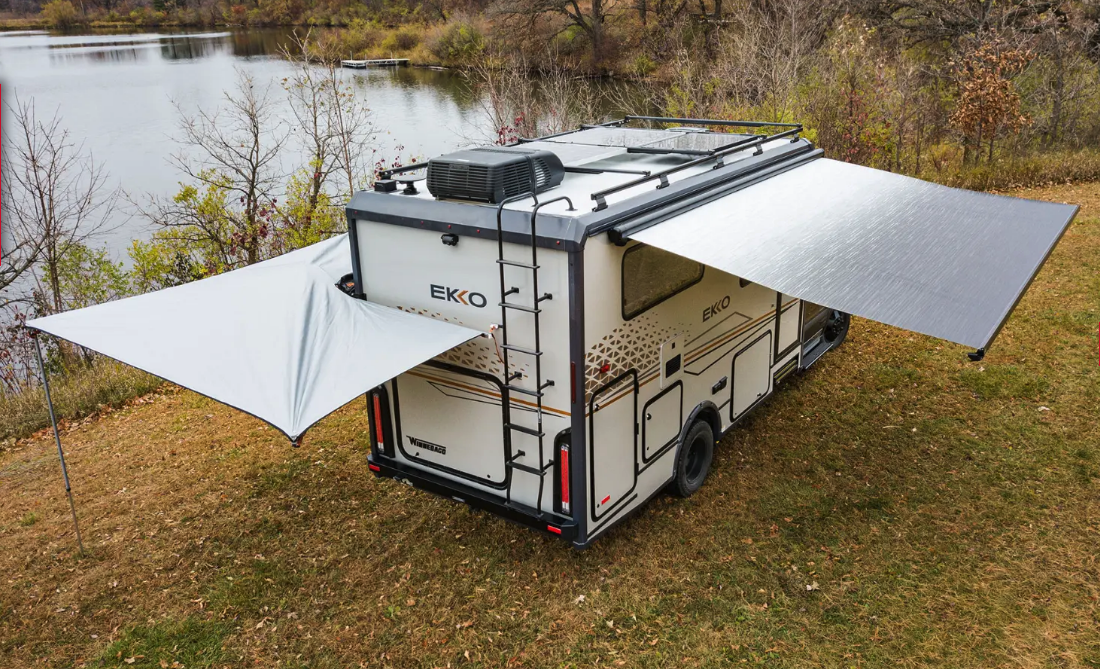
Winnebago
Inside, the Ekko ditches the dramatic expanding, sofa-filled layouts of other Winnebago Class C’s and keeps it sleek and European. That means a front-dinette with two drive-legal seats facing forward, swivel front seats, and two stow-away tables between them. The kitchen located a little farther back across the aisle debuts with a vibrant deep-red laminate countertop while offering a dual-burner gas cooktop, microwave, and stainless steel sink with worktop cover. A 150-L compressor fridge/freezer stands tall on the wall behind the main block.
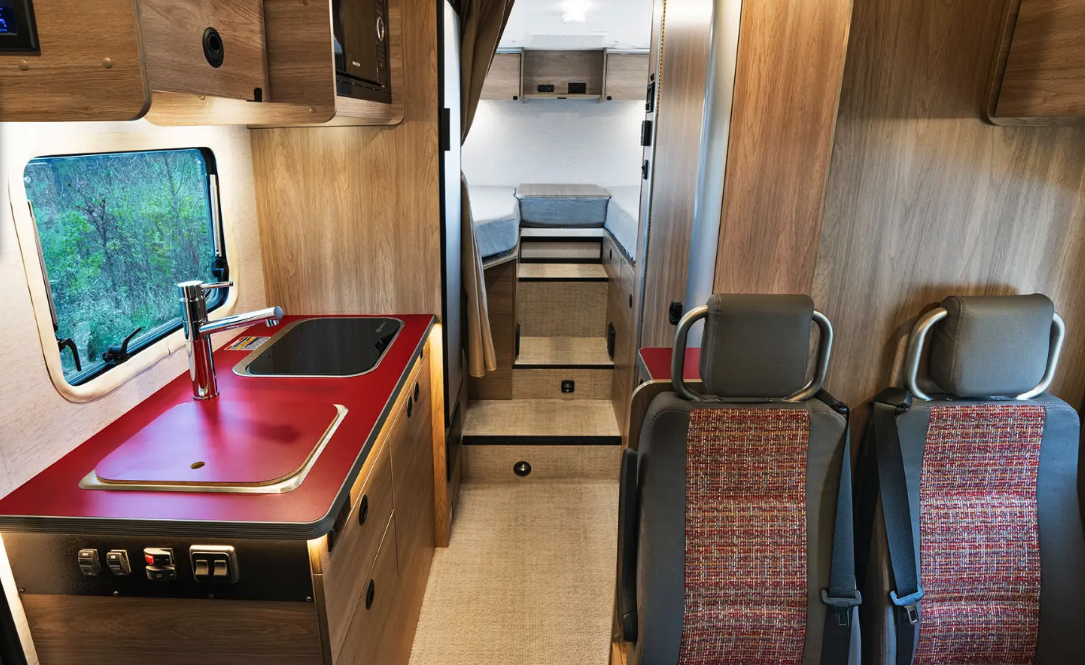
Winnebago
A nicely carved-out rear bedroom houses a bed lifted over top the full-width exterior storage garage. Winnebago makes it a Flex Bed, comprising a pair of 32 x 76-in (81 x 193-cm) twins that can connect with middle cushions to make a residential-size queen (60 x 80 in/152 x 203 cm). Alternatively, campers can sleep individually and place a solid nightstand panel between them.
To maximize usable space in the compact wet bath, Winnebago uses a clever swiveling sink wall. It’s not quite as elegant as the sliding wall launched recently on the Niesmann + Bischoff iSmove, but it serves the same purpose of stowing the sink out of the way with the toilet to create a more spacious, discrete shower space. When the shower is over, the wall swings back, covering up the shower head, and the cassette toilet swivels 90 degrees for more legroom.
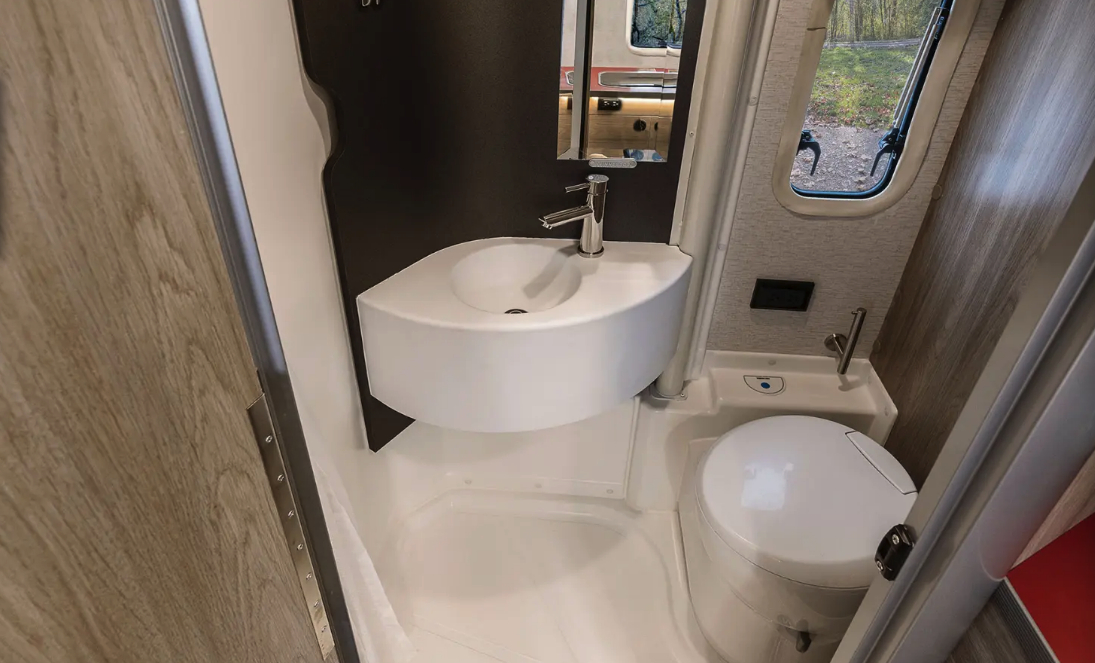
Winnebago
The Ekko comes standard as a two-sleeper, but the available pop-up sleeper roof makes it a proper family camper. It doesn’t look like Winnebago is ready to pop its top just yet, as the pre-production model highlighted in photos and videos doesn’t have a pop-up, but Winnebago promises a comfy two-person roof shelter with penthouse views. Sadly, buyers won’t be able to add on both the pop-top and slide-out kitchen so they’ll have to choose between cooking outdoors and letting the kids sleep inside the motorhome – tents are underrated, and build character.
To support the type of off-grid living that comes with wandering aimlessly over faded tire tracks or chasing weather around webs of forest road, Winnebago wires in a standard 315-Ah lithium battery with heating system, along with 455 watts of solar charging, a 2,000-W inverter, a 2,800-W Cummins Onan generator, and a dedicated second alternator for charging while driving. Buyers can also trade out the generator for a second 315-Ah battery. H2O-wise, the motorhome carries `189 liters of fresh water and can hold 193 liters of gray water.
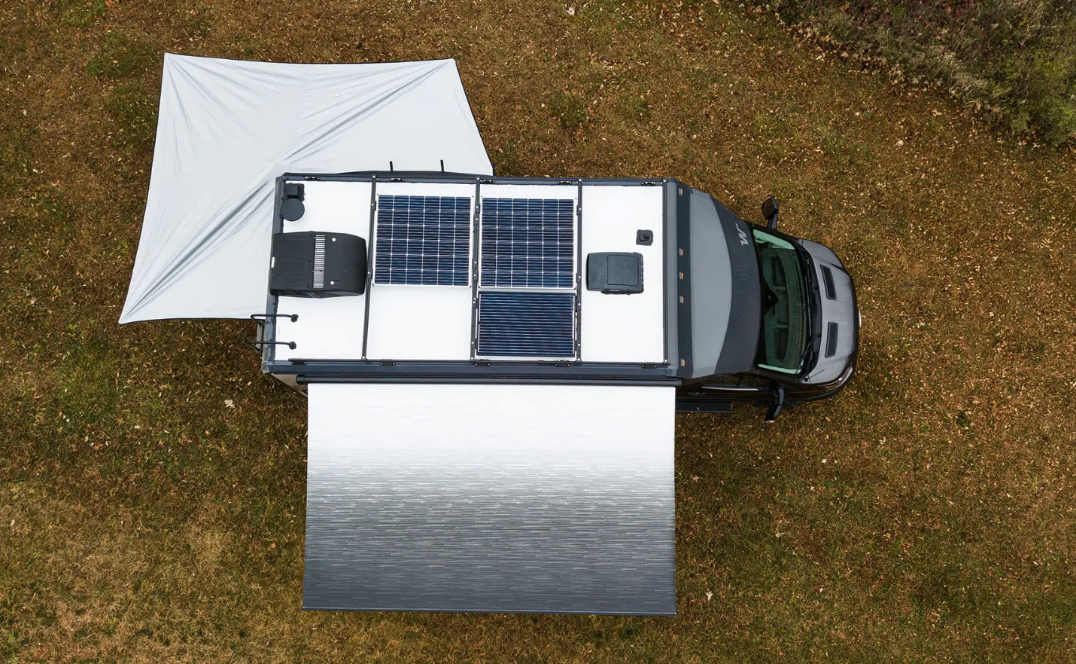
Winnebago
Winnebago introduced the Ekko on Wednesday at its virtual “Road Ahead” product preview event. It’s still a pre-production model and will launch next year as a MY2022. Specs and pricing could always change at this stage, but plans call for the Ekko to drop at the entry point of Winnebago’s Class C lineup with a base price of US$163,662. In addition to the floor plan described, Winnebago plans a larger 300-in (762-cm) Ekko with expansion slide-out and two-compartment dry bathroom. That model is will be a two-sleeper only, with no pop-up roof option.
The 12-minute video below dives into the many features of the new Ekko, including the operation of the swivel bathroom wall, which isn’t highlighted as well in the photos.
Introducing the all-new Winnebago EKKO
Source: Winnebago





